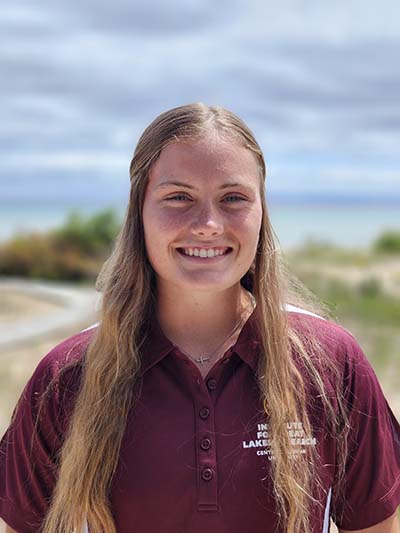
The skills and knowledge to succeed
Abdul Musaddiq Syed’s Trine University degree and the skills it provided propelled him to an extremely successful career.
September 23, 2024
 The future can be daunting, but Trine University student Peyton Schuring found answers
this summer from participating in environmental and behavioral ecology research.
The future can be daunting, but Trine University student Peyton Schuring found answers
this summer from participating in environmental and behavioral ecology research.
“Going into this research experience, my biggest hope was to figure out my plans and goals,” she recalled. “That is exactly what I got.”
Peyton is a senior biology major from Portage, Michigan. This summer, she spent 10 weeks at Central Michigan University (CMU) participating in a Research Experience for Undergraduates (REU) program working on the CMU Biological Station (CMUBS).
The CMUBS, located on Beaver Island in northern Lake Michigan, offers academic courses during the spring and summer months, and houses research facilities throughout the year.
Contributing to Team Goby
Peyton discovered the opportunity through the National Science Foundation (NSF) website. She was drawn toward the hands-on programs that focused on giving students experience that would further develop their field and lab skills needed for future careers.
“They also seemed geared toward research experience that was heavily individualized yet guided to provide a fully encompassing graduate school project experience without the three- to four-year commitment,” Peyton added.
Peyton spent her summer on Team Goby, an invasive species research team focused specifically on the invasive round goby. The round goby is a nonnative invasive fish introduced to the Great Lakes in the 1990s via ballast water of cargo ships.
“Each member of Team Goby was researching something slightly different from each other, yet related enough for us to complete fieldwork together,” Peyton explained. “For instance, my specific research was looking into round goby population sizes and body sizes concerning different baiting amounts and capturing techniques.”
Peyton was responsible for creating her own research questions, hypotheses and methodology, as well as conducting her own fieldwork, analyzing her own data and presenting her findings.
“I spent much of my time out on Lake Michigan collecting the data, which included utilizing GoPro cameras so I could count round goby population sizes throughout a 20-minute period when different baiting amounts were present,” she elaborated. “I also utilized seine nets and minnow traps to physically collect gobies to determine effective baiting techniques with different baiting amounts.”
At the end of her 10-week experience, she presented her research to the general public of both Beaver Island and Central Michigan University.
Trine’s preparation for environmental research and fieldwork
Although the REU was a new experience for Peyton, her studies at Trine prepared her well for her summer of research and fieldwork.
“I had a lot of prior knowledge of freshwater systems from my ecology, aquatic biology and environmental biology classes from Trine,” Peyton said. “I had plenty of background in how different environmental elements impact each other.”
She also had prior experience with fieldwork not only from those same classes, but also from prior field sampling experience with the Steuben County Strategic Water Quality Monitoring Project operated by Sam Drerup, Ph.D., associate professor of biology, and the Steuben County Health Department.
Moving forward: The REU’s impact on future plans
Peyton’s goal going into her REU was to determine what she wants for her future.
“I didn't know if I wanted to go to graduate school or not, and I wanted an opportunity that would give me a glimpse into a graduate research program without the commitment,” she said.
Peyton does not know for sure if she intends to go to graduate school yet. However, the REU gave her room to grow and discover what she does and doesn’t like.
“I have a clearer picture in front of me,” she stated.
Whether she goes to graduate school or not, Peyton believes the REU helped her develop many new skills related not only to research development and fieldwork but also communication of scientific information.
“In an environmental biology position, you need to be able to understand the science behind your research but also be able to explain why it is important to the public in a non-scientific way so they can understand and be as passionate about creating change as you are,” Peyton explained.
“I believe in 10 weeks you can learn a lot about the world around you and yourself. It truly was a once-in-a-lifetime opportunity, and I am so blessed to have been a part of it.”